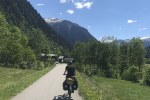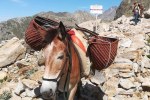News
Outdoor tourism as the new mainstream
People are increasingly seeking opportunities for recreation and balance in the mountains, whether hiking, climbing or mountain biking. This shift places demands upon destinations, inhabitants, infrastructure and nature in equal measure, and is further intensified by the corona crisis. How can outdoor tourism be made more sustainable? This question was addressed by more than 320 participants at the online conference “Outdoor tourism with a long-distance perspective” held on 16-17 November 2020. They received new impulses for strategies on visitor guidance, learned about methods of awareness raising and discussed stress limits. The German Federal Minister for the Environment, Svenja Schulze, emphasised this in her greeting: “Crisis-proof outdoor tourism requires unconventional cooperation and business models to meet changing needs”.
One photo, a thousand people
The mountain lake glows a rich turquoise, a hut nestles against rugged rocks: social media lets spectacular leisure images travel round the world, attracting thousands of people. The lecture by Dominik Siegrist from the University of Applied Sciences of Eastern Switzerland demonstrated that outdoor tourism is becoming the new mainstream owing to trends such as digitisation, health and safety. Siegrist, head of the Institute for Landscape and Open Space, is convinced that sustainable and climate-friendly outdoor tourism will not develop on its own: “It needs political will, professional know-how and sufficient financial resources”. Incentive systems can encourage voluntary action, he says, but clear guidelines and regulations are needed for effective solutions.
Up to 7,000 day-visitors visit the Triglav National Park in Slovenia in summer. “The situation is unbearable for the local population and for visitors”, says nature conservation advisor Aleš Zdešar: nobody wants to stand in line out in the open. For this reason, the administration has calculated the park’s capacity based upon social factors, weather and nature conservation. The result: a maximum of 1,500 people per day would be justifiable. Zdešar now wants to limit access to the park: “We must not only protect nature, but also ensure that visitors can experience it”.
An organisational bottleneck
Attract tourists, but not too many. Make nature accessible, but protect it. Create hot spots, but sustainably. Managing tourism has become increasingly contradictory and complex: Christian Baumgartner, tourism researcher and Vice-President of CIPRA International, is therefore advocating a new job profile: “We need someone to take care of sustainable tourism. A person who initiates projects, networks and works together with the local population”. The prerequisite for such a position is, on the one hand, political will and, on the other, appropriate further training. “Sustainability is always just an add-on in tourism education, and not yet a continuous principle.”
Calm the traffic at the Sella Joch/I through car-free days, create awareness through communication campaigns, replace disposable plastic with stainless steel bottles, revive the community and economy in Valle Maira/I: speakers from all over the Alpine arc presented a colourful range of ideas, business models and initiatives. They showed how great the potential for more sustainability in outdoor tourism still is. Alenka Smerkolj, General Secretary of the Alpine Convention was convinced: “Good ideas for solutions can only emerge from a dialogue between all those involved”.
The online conference was organised within the framework of the Alpine Convention and on behalf of the German Federal Ministry for the Environment, Nature Conservation and Nuclear Safety, by the “Alliance in the Alps” network of municipalities and CIPRA, the International Commission for the Protection of the Alps. The results of the conference can be found here:
padlet.com/cipraga/documentation_outdoortourismconference





